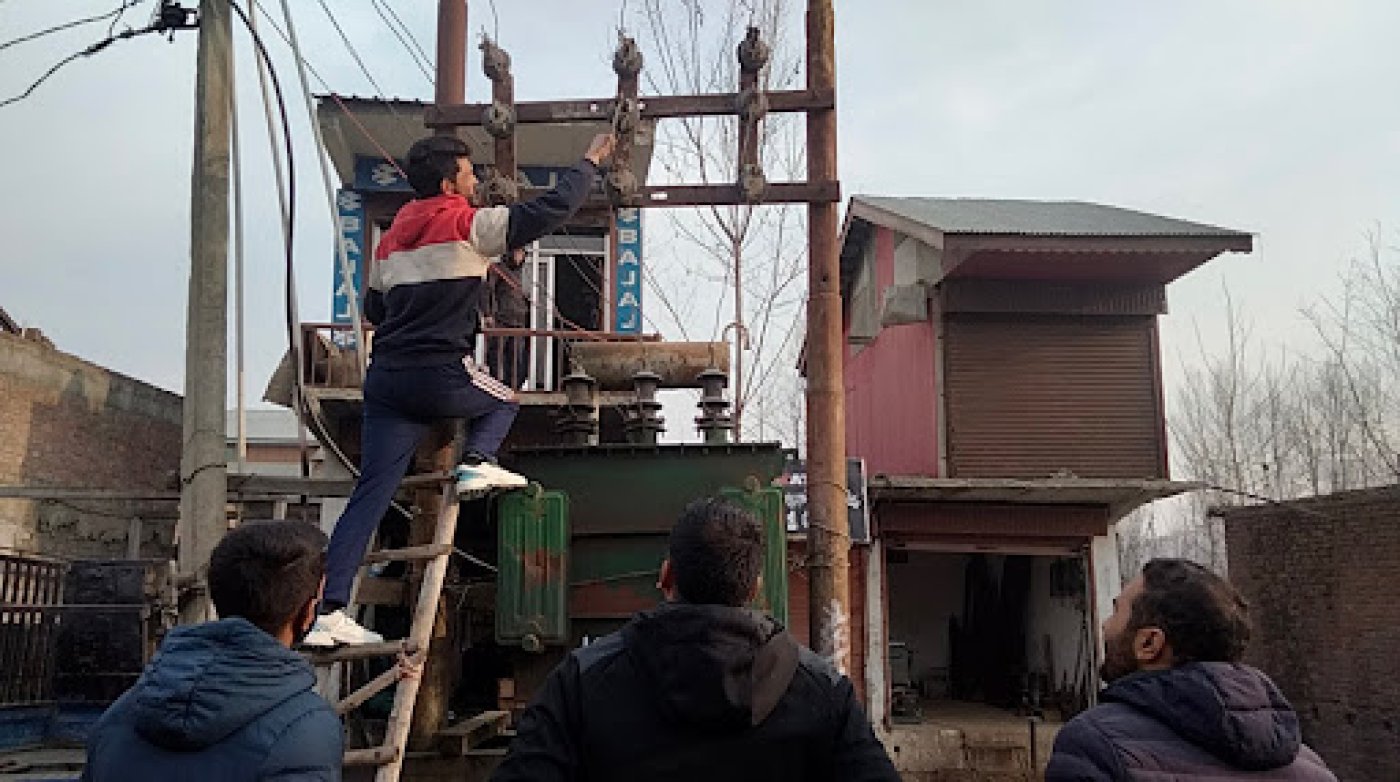Srinagar: On a cold afternoon on 2 March 2020, Shameema Akhtar’s phone rang with news that changed her life.
Her husband, Muhammad Ashraf Dar, a 36-year-old daily wage worker posted at a power grid station in Khunmoh, on the outskirts of Srinagar, had been electrocuted while repairing a transmission line and was rushed to the hospital.
Akhtar, now aged 33, said she reached the Sher-i-Kashmir Institute of Medical Sciences in Srinagar to find her husband unconscious, his body burned and motionless.
She said she waited outside the intensive care unit for 15 hours, clinging to hope. But Dar succumbed to his injuries, leaving behind a young widow, a minor son, and a series of unanswered questions about the safety conditions in Jammu and Kashmir’s (J&K) power sector, where thousands of temporary workers are employed without protective gear, health insurance or formal contracts.
“He left in the morning with his lunchbox and a promise to return early, but returned dead due to electrocution,” Akhtar told Article 14 in July 2025. “The meagre Rs. 9,000 he earned each month also ended along with his life. We have nothing in hand to run our affairs.”
Outside her modest, single-storey home in Samboora, a village in the saffron-growing belt of Pampore in south Kashmir, Akhtar spoke about the years that followed.
After Dar’s death, she said, she stopped feeling much at all. “I decided not to remarry and to stay alone for the sake of my son, Aqib Ashraf,” she said. “There is no way to manage household expenses or his education. Sometimes my brother sends a few hundred rupees. That is all we have.”
According to a September 2020 report by Greater Kashmir, quoting “official data”, more than 400 casual workers lost their lives between 2010 and 2020 while performing hazardous repairs and maintenance on high-voltage lines, transformers and substations in J&K’s power sector—averaging three deaths every month.
Yet, the families of the dead workers are often left destitute after fatal accidents, with no financial support or compensation.
As they are not official departmental employees, these daily wage workers are excluded from the benefits under the Jammu and Kashmir (Compassionate Appointment) Rules 1994 (also known as SRO 43), which supports families of deceased J&K government employees by offering either a compassionate job to an eligible family member or financial compensation to help them cope with the loss of their breadwinner.
In 2019, following the reorganisation of J&K, the Power Development Department (PDD) was restructured into several distinct public sector corporations—the Jammu Power Distribution Corporation Limited (JPDCL), the Kashmir Power Distribution Corporation Limited (KPDCL), the J&K Power Transmission Corporation Limited, the J&K Power Development Corporation, and the J&K Power Corporation Limited.
Irfan Ahmad Kawa, chairman of the All J&K Permanent Daily Labour and Temporary Daily Labour Electric Employees Union, said that since the department was converted into a corporation in 2019, not a single daily wager had been regularised and given the benefits of permanent employees.
On compensation after accidental deaths, Kawa said, “The easiest route for families is to approach the court, but most lack awareness of this option,” adding that, “Out of nearly 400 deaths, only about 50 families have actually received official compensation from the department.”
Since 2021, according to Kawa, the power department facilitates the claims of families of daily wagers, following a death, only if they have an first information report (FIR) registered against the power department by the police, under Janata insurance—a personal accident insurance scheme—under the Pradhan Mantri Suraksha Bima Yojana (Prime Minister’s accident insurance scheme), or in the form of ex gratia relief from the department.
Kawa added that most families miss out on these benefits due to lack of awareness, and because failure to lodge a complaint immediately after the death often prevents them from accessing the compensation.
Kawa said that in some cases, following the deaths of daily wage workers, families were given about Rs. 200,000—an unofficial one-time payment funded by the employees and engineers of the department—to discourage them from filing complaints with the police or pursuing legal action.
Advocate Habeel Iqbal, a human rights lawyer from Kashmir, told Article 14 that if casual daily wagers die in the line of duty, their families are legally entitled to compensation under the Employee Compensation Act, 1923 (ECA).
“They can approach the labour court to claim this compensation. In fact, several such judgments from labour courts have been upheld by the J&K and Ladakh High Courts,” Iqbal said, adding that this compensation is calculated on a “case-to-case basis”, based on the length of service and age at the time of death or injury.
Akhtar, as well as Tasleema Jan and Jahangir Ahmad Bhat—family members of deceased daily wage workers who died in 2022 and 2019, respectively—said they had not heard about any laws and schemes covering compensation and had not filed a complaint with the police.
Consequently, they had received no compensation from the government. Tasleema Jan said she had been given Rs. 200,000 in 2023. She said that she did not know the scheme under which the money was given to her.
Pirzada Hidayatullah, president of the Jammu and Kashmir Electrical Engineers Graduates Association, told Article 14 that the PDD had, in July 2025, proposed a draft policy that would bring daily wagers under the ambit of the employees’ welfare scheme, making them eligible for compensation of Rs. 1,500,000 in case of death and Rs. 500,000 for serious injuries suffered on duty.
“In the KPDCL meeting on July 3 this year, it was decided to re-operationalise the J&K Power Employees Welfare Fund and include daily wagers in the programme,” Hidayatullah said.
However, till now, despite the ECA providing a legal pathway, the burden falls entirely on grieving families to file claims, hire lawyers, and establish proof of negligence through FIRs.
Iqbal further noted that if these families are unable to afford a lawyer due to financial hardship, they can approach the chairman or secretary of the District Legal Services Authority and “a panel lawyer will be provided to them free of charge, ensuring legal support at no cost”.
Iqbal also said that departments often resist liability by discouraging families from filing complaints with the police, assuring them instead of a job or relief that rarely comes. Without an FIR proving the worker was on duty, insurance claims and compensation cases are harder to win.
Compensation For Negligence
Casual labourers in the power sector have died in many states across the country. Official data, accessed by The New Indian Express, showed that as many as 97 people, including contract workers, died of electrocution in the first three months of 2022 in Tamil Nadu. In Maharashtra, 6,717 people, including contract workers, died of electrocution between 2019-20 and 2023-24.
Families of victims often struggle to receive due compensation across the country. However, based on court rulings and recommendations from state human rights commissions, some families have been awarded compensation from time to time.
On 19 October 2023, the High Court of J&K and Ladakh awarded Rs. 2,810,000 as compensation to Pushwinder Singh, a 28-year-old daily wage worker of the PDD who was permanently disabled after suffering a severe electric shock while on duty at Neela Dab, Sunderbani, Rajouri.
The Court held the department negligent for restoring power without warning, causing the accident.
Dar had worked as a daily wager for J&K’s PDD and then the KPDCL for 18 years. He died on duty, yet his family said they received no support from the government or the department, as his family had not filed a court case demanding compensation, and the incident took place before 2021, when the insurance policies were put into place.
“I thought the government would do something. Not a job, maybe, but at least some help so we could survive,” Akhtar said. “There has been nothing.”
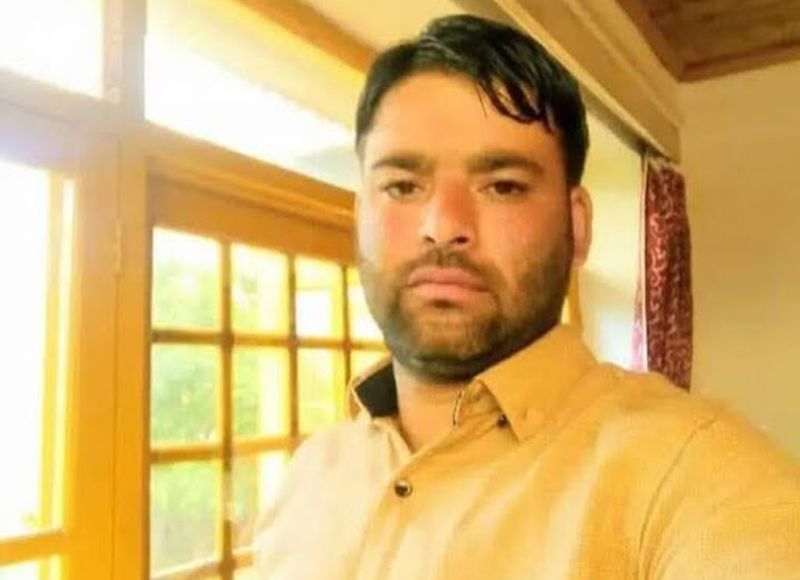
Repeating Tragedies
Two years after Dar’s death, the tragedy repeated itself in Lisser, a remote hamlet in the Kokernag area of south Kashmir’s Anantnag district.
On 31 December 2022, Salwat Rafiq, a 32-year-old daily wager, was electrocuted to death while on KPDCL duty. He had spent 13 years working for the KPDCL and PDD.
Rafiq left behind his young wife, Tasleema Jan, and two minor daughters.
Jan said she had called her husband for lunch just before the incident. “He told me to serve the rice and said he would be at the dining mat (dashtarkhawn) in five minutes,” she said.
She said Rafiq was working on a transformer in their village when “electricity was restored without any prior notice”. Rafiq never made it home.
Since Rafiq’s death, Jan said, her life has been a blur of fear and despair.
The family has not received any form of government support, ex gratia payment, insurance payout or job offer, since they did not file a complaint with the police.
According to Jan, she did not know how to lodge an FIR. “I had no awareness about where to go or how to access benefits from the schemes,” she said.
“My daughters and I have been devastated. My elder daughter and I have been on depression medication for years now,” she said.
“With no steady income, the family depends on occasional help from relatives. Sometimes my parents and others give us some money, but it is never enough.”
Jan, who now works in a private school as a multipurpose worker—cleaning, serving staff or students and carrying documents between offices—also chose not to remarry. She and her two daughters, Suffaya Salwat (7) and Zuhra Salwat (3), have not received any government compensation under the ECA as they have not approached the court. Jan claimed ignorance of the law.
Most daily wagers in Kashmir come from poor families and spend decades working for a monthly salary of just Rs. 9,000.
In their initial years, many worked without pay, hoping to prove themselves, their families claimed.
“It is exploitation, pure and simple. They make you risk your life for years without a salary. You have to prove you can climb poles, touch live wires, and survive the cold without safety gear,” said Abdul Qayoom, Dar’s brother, “Only then do they toss you a few thousand rupees as if they are doing you a favour while your life has already been on the line.”
Rafiq’s brother, Shuja Rafiq, said the department treats daily wagers as expendable. “The department takes their service, time, and energy,” he said. “But when something happens, they not only disown them but do not even come forward to see the family.”
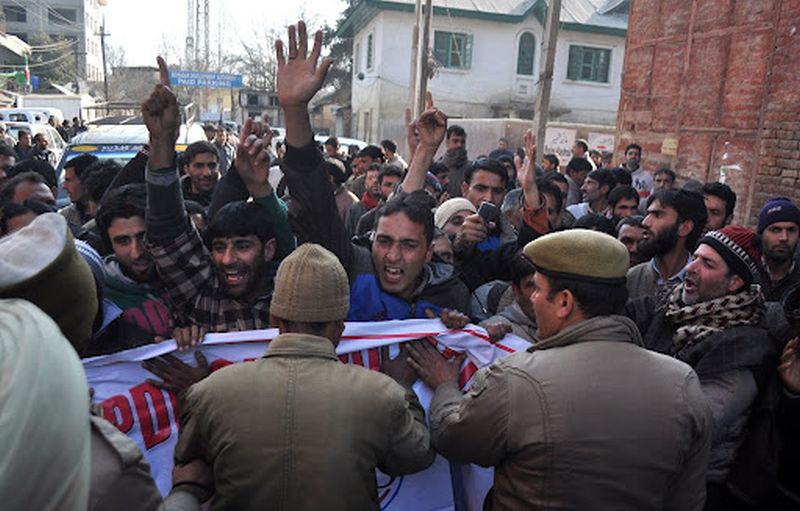
‘Cannon Fodder’
A former chief engineer of the PDD Kashmir, who retired in 2019, told Article 14 that daily wage workers are “largely responsible for their current circumstances”.
According to him, many of those who have died on duty due to electrocution joined the department by choice, often through political appointments intended to secure votes rather than based on merit or training.
“Most daily wagers were inducted without proper qualifications or training and were then assigned hazardous work,” he said.
“While permanent PDD employees preferred not to undertake these risky tasks themselves, they would frequently exploit and delegate the dangerous assignments to daily wagers, using them as cannon fodder.”
In the relentless race to repair power lines, transformers, and grids, daily wagers work without fixed hours or basic protections, holding on to the hope that one day their services will be regularised and they will secure a permanent job.
In March 2025, daily wagers in J&K, working for various public utilities, including the power department, protested in Srinagar, demanding their regularisation and the implementation of the 1948 Minimum Wages Act. They argued that the current monthly wage of Rs. 9,000 is insufficient to meet their basic needs.
However, such is the dire poverty of some families that even after losing loved ones to electrocution, they still fight for these daily wage jobs despite the risks, in order to continue receiving Rs. 9,000.
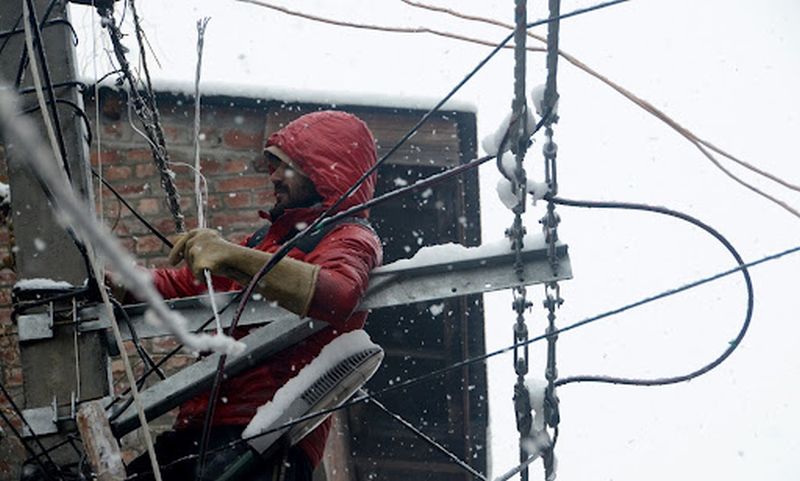
Desperate For A Dangerous Job
In Nigeenpora Kund, a village in Qazigund, 70 km south-east of Srinagar, Jahangir Ahmad Bhat has spent the last six years shuttling between departments, trying to have the daily wager position once held by his nephew, Zubair Ahmad Mir, transferred to Mir’s younger brother, Abid Ahmad Mir (30).
“I have gone from pillar to post trying to get the daily wager role transferred to the younger brother of the deceased, just to ensure the Rs. 9,000 income continues for this poverty-ridden family,” said Bhat. “But even after six years, nothing has worked out. Relatives have had to send money and rations to support the affected family.”
Recalling the day in February 2019 when his 25-year-old nephew died, Bhat said the entire village was blanketed in three feet of snow when he received a call at 4:30 pm telling him that his nephew had been electrocuted while working on an electric pole to restore power disrupted by the heavy snowfall.
“With no safety gear, proper equipment, or tools, and after repairing more than 200 poles in the snow that day, Zubair died of electrocution,” said Bhat.
“The PDD had restored power when it was not scheduled to be restored. The rest of the staff fled the scene and did not bother to help him, provide immediate treatment, or take him to the hospital.”
According to Bhat, despite the snow-choked roads and treacherous conditions, he drove to the site himself to find his nephew, lifeless, lying alone in the snow, without a single co-worker in sight.
“When Zubair died, the family’s only source of income died with him,” said Bhat.
Abid Mir, now 30, has spent the last six years trying to step into his brother’s shoes, not out of ambition, but out of sheer necessity. “All I am hoping for is to be appointed in my brother’s place as a daily wager, to earn Rs. 9,000 a month,” he said. “Just enough to keep the kitchen fire burning.”
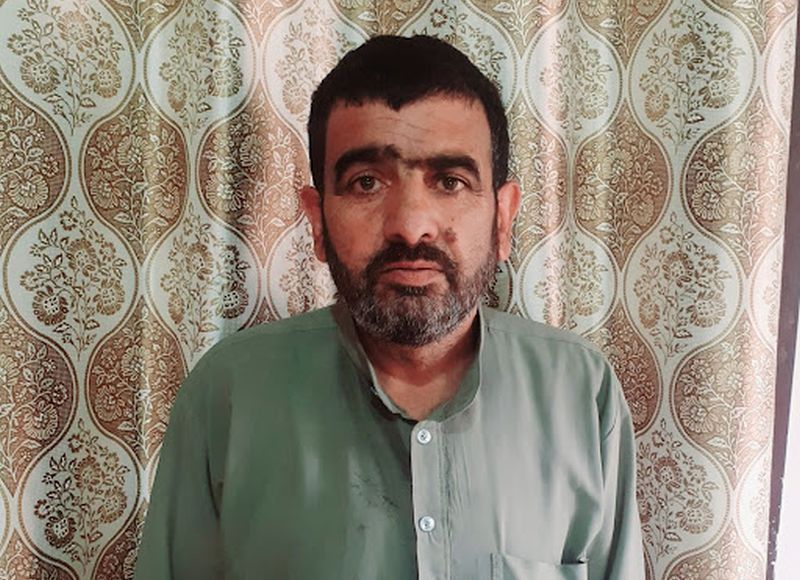
The Everyday Risks And Lingering Injuries
Khursheed Ahmad Sheikh, a 46-year-old, has worked as a daily wager with the PDD for 19 years. He comes from Batagund, a remote village in Tral, about 45 kilometres from Srinagar.
In 2008, just two years into the job, then 29-year-old Sheikh fell from an electric pole while repairing a line.
The accident left him hospitalised at the Bone and Joint hospital in Barzulla, Srinagar, for more than a month. Although he survived, the damage was permanent. He now has a metal plate in his leg and walks with a slight limp.
He could no longer climb poles or lift the loads he once handled with ease.
During cold weather, Sheikh said, the pain in his leg intensifies due to the metal implant’s sensitivity to temperature changes, causing discomfort and increased nerve sensitivity.
Sheikh’s 40-year-old colleague Riyaz Ahmad Baba said that essential safety gear such as helmets, protective glasses, face shields, proper shoes, shock-proof gloves, rain hoods and insulated trousers is rarely provided to those repairing high-voltage lines.
“There are not even enough ladders to climb the poles,” Baba said. “Casual labourers are often sent out without even basic footwear. Are our lives so cheap?”
(Irfan Amin Malik is a journalist based in Jammu and Kashmir)
Get exclusive access to new databases, expert analyses, weekly newsletters, book excerpts and new ideas on democracy, law and society in India. Subscribe to Article 14.

